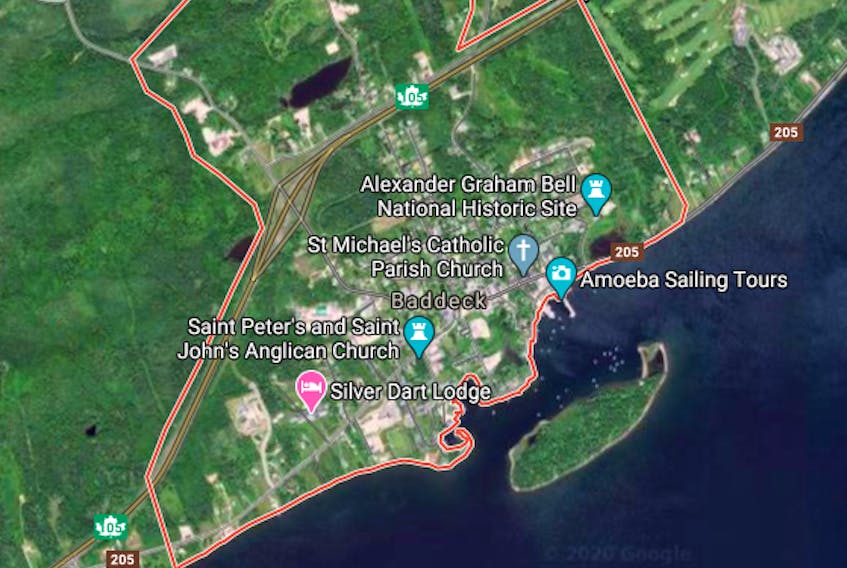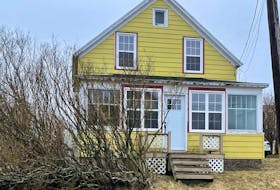BADDECK, N.S. — An overwhelmingly positive notion of expanded boundaries has replaced the dismal possibility of dissolution for the Village of Baddeck after a bold new course of action was presented to the village commission’s annual general meeting this week.
It’s a move that could see the village expand its tax base by 226 accounts to neighbouring residents, not within the village borders but still served by either village water or sewer services. The move could net an additional $138,641.64 annually.
“These are options that have never been discussed before because it didn’t make sense to invest the time to figure it all out. But now is the time to do it,” said Megan Cooper, the CAO for the Village of Baddeck.
“It was incredibly well received by the residents (Thursday) night to know that there can be an option to move forward and be sustainable as a village.”
Residents have also been paying their tax and water bills at a higher than expected rate since news of the dire financial situation of the village came to light this summer.
Discussion of the new challenges facing the village highlighted a teleconference in June when the commission that oversees the village outlined reduced tourism numbers because of the COVID-19 pandemic and associated revenue impacts on seasonal businesses.
Discussion at the online meeting included the possibility of an estimated 70 per cent drop in expected revenue. If that were to happen, continuing operations with a previous operating budget of about $535,000 was not seen as viable.
“For some time now, concern has been growing about the rate at which escalating costs are threatening the village’s financial liquidity,” Brian Morrison, former chair of the village commission said in July.
“Essentially the village has operated on a break-even basis with little or no growth in its residential or commercial tax base. We’ve come to the point where the breakdown of a piece of expensive infrastructure could be beyond the village’s reach financially to remedy. COVID-19 has added another serious and deeply troubling element to an already strained financial situation.”
MOVING FORWARD
Next moves for the village couldn’t be taken without discussions with residents and so a document was circulated to explain the situation and the possibility of a governance model review.
Though it laid out a dire financial situation, not much residential feedback was obtained.
Cooper said a motion to pursue dissolution was then presented at the August meeting of the commission to "continue with and move forward with discussion" with the province and the county. That motion did not pass.
It was then that Cooper started researching alternative means for revenue streams and essentially, alternatives to dissolution.
“It was incredibly well received by the residents (Thursday) night to know that there can be an option to move forward and be sustainable as a village.” — Megan Cooper, Village of Baddeck CAO
Expanding the tax base by 226 was the biggest of the options, but other positive news was presented at Thursday’s AGM, as well.
Those in attendance learned that residents have been paying their property tax at a much higher rate than expected, and only $37,000 of the roughly $245,000 in area rate revenue from 562 accounts remained outstanding as of Sept. 30.
It’s still important for the village to collect the remaining balance, but it is not as dire as it initially seemed several months ago, said Cooper.
“Is it going to be essential for operations? Not necessarily but the thing is, as with all local governments across the province, property taxes are the primary source of revenue for everyday operations for salaries, for fire services, for emergency services, for streetlights. That’s where the property taxes go. If we are not receiving the money sent out for those services things get a little more complicated. Is it going to be a deal-breaker? I really don’t think so.”
COST-SAVING MEASURE
Moving on from an agreement that sees Victoria County collect all tax revenue, less 10 per cent, could be another cost-saving measure to assist the village’s viability.
The estimated cost for that collection service translates to an estimated $24,000 payment to the county and Cooper is proposing that the village save that money by collecting the tax revenues themselves.
“I already have all the accounts. I already have the assessments for which the area rates and fire protection rates are based. I already send out water bills, so I have the system to do it.”
She presented costs of that measure at this week's meeting.
It could mean anywhere from $1,274 to $4,000 in costs for the village, depending on how quickly residents pay their bills.
Another good sign has been the payment of water bills at a six per cent higher rate than over the same July-September period last year.
Next steps in the process will come after the election of a new village commission, which was set to take place on Thursday but was delayed until Friday due to COVID-19 spacing issues, cold temperatures and other factors.
Once the new commissioners are elected, a vice-chair and chair will be selected at the December meeting.
Cooper has recommended to the current commission that a community engagement session be planned so that the options, including expanded boundaries, can be presented to residents. She expects those sessions could take place early in the new year.
To expand boundaries, 66 per cent of residents affected must agree and approval must come from multiple government departments.
“Things aren’t going to happen overnight but in order to initiate the process we need to have the survey done, see what the interest is going to be in order to provide services beyond what we currently do and increase the tax base.”
Greg McNeil is the business reporter at the Cape Breton Post.









